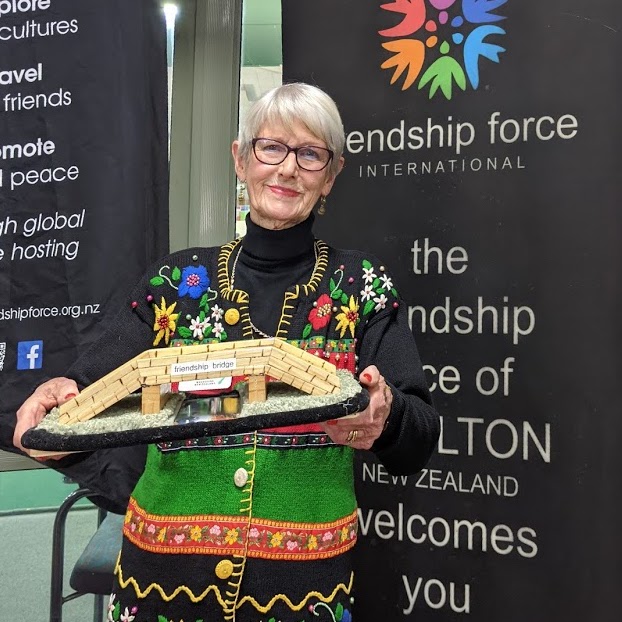I’m writing this from my part of ‘Down Under’ – also known as New Zealand – where 25 years ago I became a member of Friendship Force, simply because of a chance meeting with a stranger while passing through Auckland. I was enroute home from Sydney to Whangarei when a friendly stranger said to me, “You look like the sort of person who would enjoy Friendship Force!” On my arrival home, a club member locally phoned us with an invitation to come along to the next meeting. We went, we saw, and we were conquered! We have traveled!
Fast forward to 2020. Right now, COVID-19 is the trigger-point of a world health and economic crisis. The responses to this crisis have decimated the global travel industry, along with the main rewards of FFI’s mission. We are travelers denied this pleasure. The delectable icing on the cake for FFI members is to travel together, far and wide, making strangers into friends in the name of peace. If we can’t travel for a year or two, what have we got to offer? How can we make a difference?
The word crisis comes from the latinized form of the Greek word krisis, meaning a turning point. It is a time for decisions and an opportunity for growth. FFI has been pro-active this year; already, there are a host of great new Friendship Force initiatives available to us. There are a range of ways to engage with others around the world even when staying home, using the wonders of digital media. These options bring personal satisfaction, individual rewards, opening doors to world friends. But is that enough?
Member numbers have been steadily falling in New Zealand over the past 10 years. Drastically, in fact. This has nothing to do with the COVID-19 pandemic. It’s to do with a lack of national publicity, leadership training, and coordinated marketing expertise.
To thrive we urgently need inspiring younger members (<70 years) to take over the leadership roles and to develop clubs with big-picture vision and purpose.
There are plenty of thinking people, today, looking for purpose and belonging. We just haven’t bothered to look for and find them. We’ve been too busy with the details of where to travel next, without working to attract new folk via the big picture principle of FFI – A World of Friends is a World of Peace.
I’m part of Friendship Force for the numerous good things it has to offer. But underlying all the action, my main reason is my strong belief that belonging ‘together’ in a club is key to making a difference in the world. Clubs with a purpose create community.
Community provides the glue that holds society together.
Never in history has the world needed community-building like it does today. Digital connections are one avenue but they will never be a substitute for connecting and that feeling of belonging at club events, or for home hospitality, personal relating, eating together, and conversations about our world and cultures.
Below are some key points and ideas from my workshop at the conference in Boulder last year to help you get started.
Decide to be part of changing the world for good. What happens at club meetings is vital.
Create and use an intentional plan to boldly demonstrate our purpose, strengths, and unique differences.
Inspire your members. Their friends and contacts are our next members.
- Use a proactive club meeting format that engages with our main purpose – world peace. Always read the Pledge with pride at club events. Be different!
- The power of introductions – introduce first your visitors, then the key members at the event. Try 3-minute mini-talks by newer and older members, with time for chatting and making connections.
- Spend time building relationships. Don’t cram events with speakers it is more interesting and engaging if your events are interactive.
- Induct new members with style.
- Use a large world map marked with the locations of the clubs you have visited and hosted
- Ask incoming guests to bring a map of ‘their place.’ Add their place to the world map, with ceremony and style!
- Use a universal ceremony of thanks at meals.
- Sing your national anthem for overseas visitors, or at special club events.
- Incorporate and normalize greetings and rituals in other languages – e.g. in New Zealand, use the Māori language.
- Encourage an attitude of hospitality and helpfulness at all times between club members and others.
- Mix up the seating at club meals or meetings. How? Make numbered cards in two colors – one color randomly placed on tables or seats; the other taken from a basket handed around.
- Use music, the world’s universal language. Create a music group to lead and initiate fun.
 Success is not a program, it’s a personal growth journey for each of us, empowering us with the knowledge and skills to reach out to others, in love, acceptance, and peace. It is learning how to give and receive true friendship. “What the world needs now, is love, real Friendship Force love…….”
Success is not a program, it’s a personal growth journey for each of us, empowering us with the knowledge and skills to reach out to others, in love, acceptance, and peace. It is learning how to give and receive true friendship. “What the world needs now, is love, real Friendship Force love…….”
